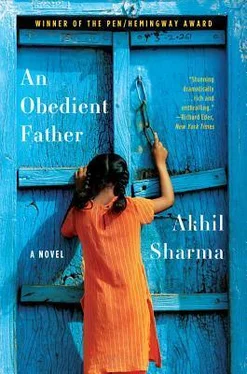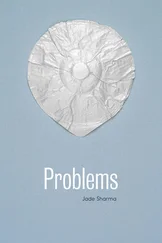meat." I smiled and nodded. "Will you come with me to Mr. Gupta's?" he asked, pulling off the last piece of flesh from a chicken bone and depositing the bone into a polythene bag with other bones. I was dressed in a white kurta pajama, ready to join Ajay's funeral procession.
"It's a tragedy," I said, and then, waiting a beat, "The boy caused so much trouble for his father."
Mr. Maurya considered this. "My leg is bad, so I can only walk a short while with Ajay."
I was encouraged. I again paused for a moment and said, "We are going to lose the election."
Mr. Maurya put the napkins in the bag and knotted it.
"If we are frank, it appears that way."
"What will Congress think of you for having worked with the BJP?"
"Sometimes you make mistakes." His allowing me to question him was promising. "The BJP will take Delhi municipality but will lose the Parliament seat. Congress will be angry for a while, but in time it won't be so bad."
"I want to protect myself" Mr. Maurya watched me. "My daughter just became a widow. I need to take care of her and my granddaughter." He remained silent. "You have friends in Congress who could help me," I said.
Mr. Maurya sighed and moved the bag to one end of his desk. "Friendship is just a word, Mr. Karan."
"I can pay Congress if they promise not to have me jailed or bring corruption charges against me." I did not want promises to be made to me. People either need to have a history together or need to be equals before promises between them count. My hope was that promises would be made to Mr. Maurya.
He could give Congress an enormous donation and claim that he had convinced me to betray Mr. Gupta in exchange for amnesty. Mr. Gupta's money would give Mr. Maurya more clout than the same amount donated from his own pocket.
"My business is local. I can't anger the BJP."
"The BJP knows Mr. Gupta is going to lose. Him against Rajesh Khanna. All they wanted was to put up some candidate against Rajesh Khanna. I'll pay the BJP, too. They'll be happy to get whatever money they can from his campaign and let Mr. Gupta go." Mr. Maurya sat back in his chair. "Friendship is just a word. Nobody expects your heart, Mr. Maurya." He did not say anything. "You've done a good job for Mr. Gupta. Now he is losing. That doesn't mean you haven't done a good job or that you should drown with him."
"How much money can I give Congress?"
"Seven lakhs."
"A nice amount." After a moment Mr. Maurya said, "I can help."
I reached into the plastic bag I had brought with me and pulled out one of the two bundles of bankbooks I had prepared. "Withdraw the money quickly."
Mr. Maurya took the bundle, put it in a drawer, and said, "We have to go separately to the funeral."
I thought Anita would be impressed by how well I was managing Mr. Gupta's betrayal.
Thirty or forty women in white saris were seated on Mr. Gupta's courtyard floor. There were about a dozen men, also in white. A tent roof had been put up for shade. Some of the people looked too poor to be Mr. Gupta's relatives and must have been servants recruited to make the mourning grander. The doors to one of the rooms that bordered the courtyard were open and I could see a gray steel coffin on the floor. The coffin was surrounded by more men and women in white. I did not know many Christians, so this was only the second or third coffin I had ever seen. It was half a meter deep and narrower on one end than the other. It appeared to be such an example of technology that it felt inappropriate. Some of the gathering were crying, but most were quiet and attentive. Servants in white were edging through the veranda pouring water from steel pitchers into glasses. Outside the house poor children stood barefoot and watched, in case food or used clothes might be distributed.
As I waited to see if a servant would direct me, I saw Anita leading Pavan into the room with the coffin. Anita had an arm around Pavan and they were taking small steps together. The crowd parted to let them get to the narrow part of the coffin. Anita eased Pavan down. When one of Ajay's brothers-in-law had called earlier and told me the time of the funeral procession, Anita had been specifically invited.
Mr. Maurya appeared, did not acknowledge me, and went and sat against a courtyard wall.
I entered the room with the coffin. There was no smell. Pavan was sitting hunched down into her knees. Anita saw me and came over. "The doctor gave her an injection," she whispered. "A calf has tried getting into the house the last few days and Pavan began saying it was Ajay reborn. We told her that the calf was at least six months old, but Pavan became crazy."
"What happened to the calf?"
"One of her father's friends has a farm and they've taken it there in case it actually is Ajay."
Mr. Gupta, Ajay's father-in-law, and the two brothers-in-law appeared. Again the crowd parted to let them get beside the coffin. They were all dressed in white kurta pajamas. They stood near the coffin not talking. Anita's face grew still and concentrated. "Ajay must have fought. Who can let his throat be cut?"
I went up to Mr. Gupta, but he did not appear to recognize me.
"Come," Ajay's father-in-law said, and one by one, with Mr. Gupta last, they stooped to pick up the coffin handles along its sides. They lifted it to their shoulders, which made me think that the coffin could not be as heavy as it looked.
As soon as the body was lifted, the women both inside the room and in the courtyard began wailing. Then, together, instantly, they stood. When the men took their first steps, the women mustered in front of them. Some of the women shook their hands while crying as if their fingertips were burnt. Others pressed their temples between their hands. The men attempted to move again, but the women would not budge. Mr. Gupta's and Ajay's father-in-law's
faces were blank, but the brothers-in-law looked afraid. A few of the men in the room began moving the women out of the way. The noise was so great that I could hear only a few words of what these men were saying.
In the courtyard the coffin again became completely surrounded by women. They did not budge as they shouted, "What shall we do now?" or "Save us, God!" or "Why are you leaving us?" Mrs. Gupta appeared to be pushing Mr. Gupta so that he would drop the coffin. After a moment of standing in this frenzy, the coffin retreated.
A few minutes later it was again carried into the courtyard. Some men tried opening a path through the women, but the women kept filling whatever gaps were forced. Again the bearers began retreating. As they did, Mr. Gupta's wife shouted at Mr. Gupta, "You're a man. Push us out of the way." Mr. Gupta sobbed and stood still. A man grabbed Mrs. Gupta and shoved her stumbling out of the coffin's path. Others began doing the same to the rest of the women.
The weeping became enormous and inconsolable. I moved into a corner.
The coffin was finally carried out of the house, with its bearers quickly chanting, "God's name is Truth." About twenty-five men followed, also repeating this. It was so hot and bright that everyone was squinting. I was one of the last to join the march. Mr. Maurya was not far from me.
The house we left behind was wailing. Pavan had begun beating her head with her fists. Mrs. Gupta stood behind Pavan, with her arms wrapped around Pavan's stomach. Anita was sobbing.
The farther we got from the house, the quicker we walked. The poor boys trotted along, watching us silently. People came onto the balconies of their houses to look. Mr. Maurya accompanied the procession for a block and then got into a car. There were three groups. Directly behind Ajay's bearers were family and friends. Behind this was a smaller bunch of BJP men. Last was the largest group, neighbors and business acquaintances.
Читать дальше












